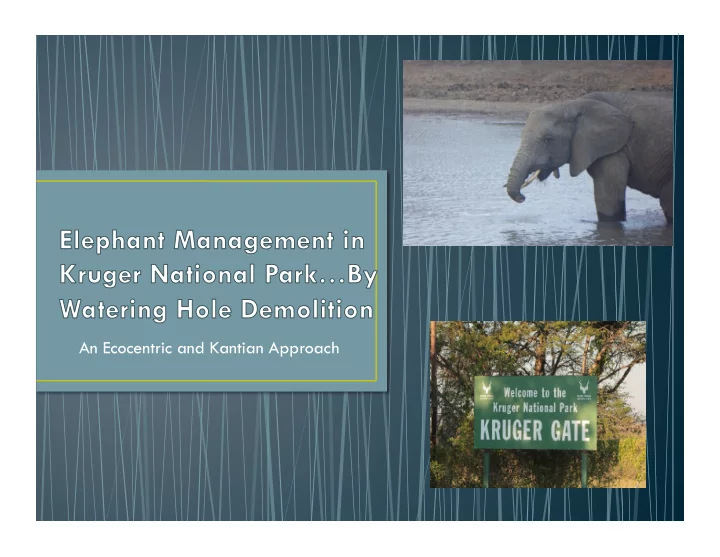

An Ecocentric and Kantian Approach
• Elephants have wildly surpassed their carrying capacity of 8000, and the most conservative estimate placed the population at 13750 in 2010, with the population most likely rising above 16000 currently. • Due to negative public reception, a moratorium was placed on culling in 1994, and a new population management technique was sought. • In 2010, a master plan was created which focused on the destruction/drainage of both natural and artificial watering holes in order to decrease both the spatial distribution and population of elephants in KNP.
• Elephant behavior has destroyed much vegetation in KNP , home to upwards of 2000 different plant species. • Over a span of 30 years, the density of marula and knobthorn trees in the Satara region was reduced to 6.4% of its former levels. • In addition to decreasing soil quality, the sharp decline in vegetation changes the habitat composition of numerous species. • The species most affected by the elephant population is the critically endangered ground hornbill, whose nesting trees are being destroyed by elephants.
• According to Holmes Rolston III, environmental ethics is “the theory and practice about appropriate concern for, values in, and duties regarding the natural world”. • Claims of animals count in Environmental Ethics. • Holds 6 levels of concern: humans, animals, organisms, species, ecosystems, and Earth. • Typically subdivided into 4 groups: Anthropocentrism, Sentientism, Biocentrism, and Ecocentrism. • Within Ecocentrism, there is a de-emphasis on the respect for individuals, and values individuals as a function of their contribution to their greater ecosystem’s health.
• An Ecocentrist would not support the demolition of watering holes in order to control the elephant population within Kruger National Park. • Values of Ecocentrism • While the current elephant overpopulation has effected the ecosystem (specifically the vegetation), the destruction of numerous watering holes will affect countless other species. • Prey species cluster around watering holes for drinking, while many predator species stalk these watering holes for prey.
• Without these watering holes, a number a species could die of thirst, or lack of prey. • These relationships are carefully balanced, without them, ecosystems could be completely changed or destroyed. • Within ecocentrism, ecosystem health is valued over individual animals, so any detrimental effects overpopulation has on the elephants or other individual animals are less important than those on the greater ecosystem. • “Super killing” and the sable antelope.
• Deontology is the view which searches for universal moral rules in order to answer philosophical questions. • The most famous form of Deontology, which was founded by the famous philosopher Immanuel Kant. • 4 key points of Kantianism: - Categorical Imperative - Anthropocentrism - Rationality - Indirect Duty
• A Kantian would support the demolition of watering holes in order to control the elephant population within Kruger National Park. • For Kantians, the dividing line between humans and non-humans is rationality, and only humans have rationality (and thus are valuable). • Due to their lack of rationality, elephants are not valued, and thus any elephant deaths, or other animals, caused by the demolition would be of little concern to a Kantian. • As these animals are wild, and not property, indirect duty would not come into play for these elephants.
• Because no humans live in Kruger National Park permanently, any detrimental effects on the ecosystem would have minimal impact on humans (the only beings with intrinsic worth). • A decrease in the elephant population would increase the health of the ecosystem, which would increase biodiversity and improve tourist experiences. • The lives of a few thousand non-rational beings (elephants) is a small price to pay, to a Kantian, for an improved human experience.
• The demolition of watering holes in Kruger National Park poses an ethical quandary, as this action can not only effect the lives of thousands of elephants, but the entire park’s ecosystems. • An Ecocentrist, who supports the health of the ecosystem above individuals, would not support this action because the destruction of the watering holes would cause untold damage on the greater ecosystem. • A Kantian, who only values rational humans, would support this action because the lives of non-rational beings (elephants) matter little, and a reduction in population size could generate a better experience for humans.
The End
Pienaar, D. (2012). Elephant Management Plan Kruger National Park 2013-2022 . Skukuza: South African National Parks. Rolston III, H. (2003). Environmental Ethics. In The Blackwell Companion to Philosophy (2nd ed., pp. 517-530). Oxford: Blackwell Publishing.
Recommend
More recommend